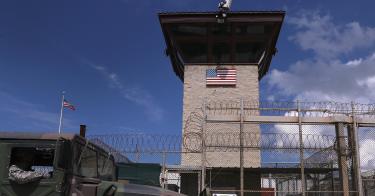Sometimes you just have to scratch your head with this administration.
While the Biden administration’s own director of national intelligence has assessed that “ISIS, al-Qa’ida, and Iran and its militant allies continue to plot terrorist attacks against U.S. persons and interests,” the administration is calling for the terrorist-detention facility at Guantanamo Bay to be closed.
Granted, Gitmo isn’t what it used to be. There are only 39 detainees left there, but those 39 include the five 9/11 co-conspirators, the bomber of the USS Cole, the Bali bomber and other senior terrorist leaders.
Even after the disastrous withdrawal from Afghanistan earlier this year, Gens. Mark Milley and Kenneth McKenzie, respectively the chair of the Joint Chiefs of Staff and the commander of U.S. Central Command, both testified before Congress that the war on terror is not over, not even in Afghanistan.
So why should we release more terrorists from Gitmo so they can go back to the fight?
The Taliban have already ensconced five Gitmo grads in senior government posts—Mohammad Fazil Mazloom now serves as deputy minister of defense, Norullah Noori as acting minister of borders and tribal affairs, Khairullah Khairkhwa as acting minister of information and culture, Abdul Haq Wasiq as acting intelligence director and Mohammed Nabi Omari as governor of Khost province.
The first four were freed by the Obama administration in exchange for a deserter, Army Sgt. Bowe Bergdahl.
The director of national intelligence has been tracking the number of Gitmo grads who are confirmed or suspected of going back to the fight. Of the 729 detainees transferred from Gitmo, 125 (17.1%) are confirmed to have reengaged in the fight, and another 104 (14.3%) are suspected of having done so.
This kind of recidivism is too often fatal. We know that Gitmo grads have killed Americans and our allies. Why let more out to do the same?
The United States remains in a state of armed conflict, and we are entitled to detain opposing enemy forces for the duration of hostilities. Those forces include the terrorists currently detained at Guantanamo.
Since at least 2005, the facility has been a safe, secure, humane detention facility for law of war detainees. It is in compliance with Common Article 3 to the Geneva Conventions. That was the opinion, and the findings, of both the Bush and Obama administrations.
After Alain Grignard, deputy head of the Organization for Security and Cooperation in Europe, visited Guantanamo in 2006, he said, “at the level of the detention facilities, it is a model prison, where people are better treated than in Belgian prisons.”
The debate over closing Guantanamo has been overtly political.
Recall that when then-Sen. Barack Obama won the White House 2008, he promised to close Guantanamo as president. Democrats held a 57-41 majority in the United States Senate and had a 257-178 advantage in the House. If the president needed any legislation to close Guantanamo—a debatable point—or simply the political backing of the majorities in both houses of Congress, the stars were aligned for him to do so.
But he failed, in large part due to members of his own party. Senators such as Richard J. Durbin of Illinois and Charles E. Schumer of New York were all for closing Gitmo during the Bush years, but when Mr. Obama tried to move detainees to their home districts, they reversed course and were suddenly against it.
Mr. Durbin said that bringing detainees to a prison in Illinois was “politically impossible.”
The Biden administration hasn’t developed a comprehensive plan to close Gitmo, and likely won’t. So, unless and until the war against terror officially comes to an end, the detention mission at Gitmo will continue, and the Democrats have no one to blame but themselves.
This piece originally appeared in The Washington Times




